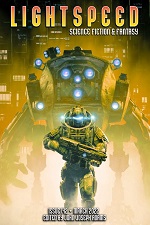“The Heaven That They Never Knew” by Merc Fenn Wolfmoor
“Bhatia, P.I.” by Shiv Ramdas
“An Exegesis of the Socioreligious Ramifications of the Collection of Peribi” by Daniel David Froid
“Hood Alchemy” by Nicole D. Sconiers
“Nine Tails of a Soap Empire” by Maria Dong
“The Historiography of Loss” by Julianna Baggott
Reviewed by Mike Bickerdike
Four new short stories and two pieces of flash fiction are offered this month, equally split between SF and fantasy.
“The Heaven That They Never Knew” by Merc Fenn Wolfmoor is flash fiction that tells the tale of one person’s intervention to stop a civilisation-ending event. A spherical ‘membrane’ the size of a small moon is travelling toward Earth full of machines that threaten Earth’s future. The method of human intervention seems to make little sense however; why crawl for seventeen days over the membrane from where the shuttle landed to the membrane’s opening? If the intrepid human has protection against detection, why not land near the opening of the membrane? Given the shortcomings in the brief plot and the idiosyncratic writing style, this tale rather failed to convince.
“Bhatia, P.I.” by Shiv Ramdas is a fantasy novelette, following the adventures of Indian paranormal investigator Mr Bhatia, and it’s a real blast. Funny and written with a brisk pace, this is a highly engaging tale that is likely to amuse and entertain. The titular PI, aided by his far more competent secretary, has no cases, no money and faces imminent eviction from his Delhi office by his own mother. His prospects change when he’s engaged to undertake a dangerous paranormal case—but do they change for the better? This is a superior modern fantasy comedy and is recommended reading.
“An Exegesis of the Socioreligious Ramifications of the Collection of Peribi” by Daniel David Froid probably comes under the heading of strange or weird fiction, though technically, it is SF. The tale is told as seven brief vignettes, starting at part 6, and counting back in time toward part 0, with each episodic part recounting a stage in the fate, criticism and invention of a series of fictional plastic toys that created a fanatical craze among children at the end of the 20th century. The earliest sections, set farthest in the future, imagine self-inflicted calamity upon humanity, and the prose is thick with sarcasm and negativity. The middle vignettes, especially the brief tale of a lad who is told by his Sunday school teacher that the toys are evil idolatry, are more measured and successful. The author conveys strong ideas against religious teaching and social media throughout this section. In places, the piece is too obviously striving to be clever and insightful, and it over-extends in its sarcasm in the initial vignette. It does become more interesting and thoughtful as it progresses, however, and overall it’s sufficiently interesting to be worth giving a go—some will love it, though some will certainly not.
“Hood Alchemy” by Nicole D. Sconiers is a superior piece of flash fiction, which is just long enough to enable the telling of an engaging story, written in good, not clipped prose (as is so often the case with flash fiction). The tale tells of the hopes and dreams of teenage girls in the ‘hood’ who aspire to rap stardom. For these girls, the wearing of ‘bling’ earrings offers a satisfying substitute for genuine escape and riches, but such adornments come with a price. The piece is thoughtful, full of truth, and carries a heartfelt message.
“Nine Tails of a Soap Empire” by Maria Dong is a fantasy short story that evoked quite mixed feelings. If a short story provides a novel idea and is also well executed, there is every chance it will be critically well received. This tale provides the ideas but is unfortunately let down by execution. The story presents an imaginative fantasy world, in which practitioners of ‘small magic’ can communicate with and enchant inanimate objects. The protagonist focuses her efforts on the manufacture of soap, taking the wind from the top of a mountain to imbue it with freshness, for example. She also wishes to establish an empire, though the reason for this or why she thinks soap will be a good starting point is less than clear. While the idea may be novel, the tale is let down by an obscure and disjointed plot, such that the point of the story and the motivation of the lead character are well hidden, even by the end. This is rarely a successful gambit in short fiction and I’m not sure it’s successful here.
“The Historiography of Loss” by Julianna Baggott is a well-rendered SF short story that covers sombre themes, but in a successful and engaging way. Stories that involve the reinstatement of dead people as some form of 3-dimensional avatar are fairly common in SF. This is such a tale, though Baggott brings enough novelty to the technical approach and tone of the piece that it seems relatively fresh. A woman in her late thirties (a historiographer) is considering becoming a mother, and reflects on her own parents, who were too young and who failed her. To better understand her late father’s motivations she obtains a recreation of him. There is a depth and honest seriousness here that is quite compelling, and the tale is well-crafted. Recommended.
More of Mike Bickerdike’s reviews and thoughts on science-fiction can be found at https://starfarersf.nicepage.io/
 Lightspeed
Lightspeed